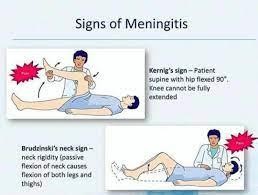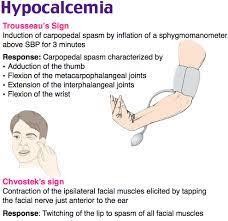A nurse is caring for a client with a new diagnosis of Paget's disease. The nurse anticipates the provider will prescribe which of the following medications for this client?
Colchicine
Alendronate
Prednisone
Allopurinol
The Correct Answer is B
Choice A rationale: Used primarily for gout and familial Mediterranean fever, not for Paget's disease.
Choice B rationale: Alendronate is a bisphosphonate commonly used to manage Paget's disease by slowing down bone breakdown and reducing the risk of complications.
Choice C rationale: Prednisone is a corticosteroid used for various inflammatory conditions but not typically prescribed for Paget's disease.
Choice D rationale: Used to lower uric acid levels and prevent gout attacks, not a primary medication for Paget's disease.
Nursing Test Bank
Naxlex Comprehensive Predictor Exams
Related Questions
Correct Answer is B
Explanation
Choice A rationale: This is a positive Trousseau's sign, which indicates hypocalcemia or tetany. It is not related to meningitis or meningeal irritation.
Choice B rationale: Kernig's sign is indicated when there is resistance and pain with knee extension and hip flexion, suggesting meningeal irritation.
Choice C rationale: This is a positive Homan's sign, which indicates deep vein thrombosis or phlebitis. It is not related to meningitis or meningeal irritation.
Choice D rationale: This is a sign of nuchal rigidity, which indicates meningeal irritation, but it is not specific to Kernig's sign. Nuchal rigidity can also be caused by other conditions such as cervical arthritis or muscle spasm.

Correct Answer is C
Explanation
Choice A rationale: Chvostek and Trousseau signs are not typically associated with hypothyroidism.
Choice B rationale: These signs are not commonly related to pineal tumors.
Choice C rationale: Chvostek and Trousseau signs, indicating neuromuscular irritability due to hypocalcemia, are often seen in hypoparathyroidism.
Choice D rationale: Chvostek and Trousseau signs are not characteristic findings in pheochromocytoma.

Whether you are a student looking to ace your exams or a practicing nurse seeking to enhance your expertise , our nursing education contents will empower you with the confidence and competence to make a difference in the lives of patients and become a respected leader in the healthcare field.
Visit Naxlex, invest in your future and unlock endless possibilities with our unparalleled nursing education contents today
Report Wrong Answer on the Current Question
Do you disagree with the answer? If yes, what is your expected answer? Explain.
Kindly be descriptive with the issue you are facing.
